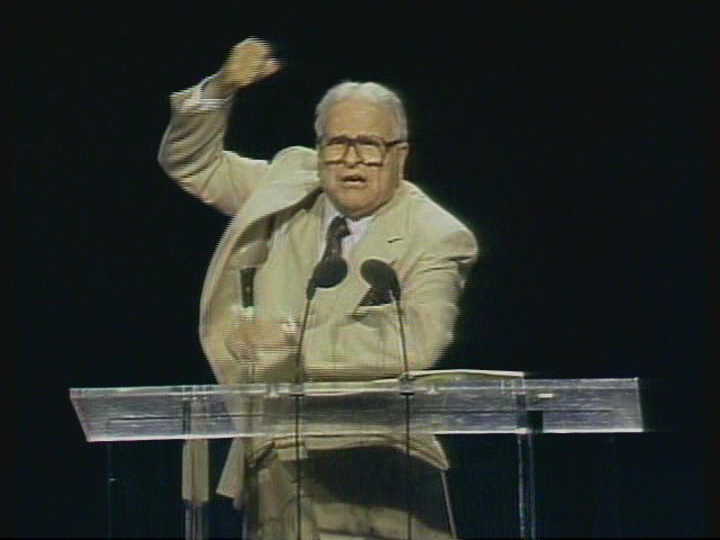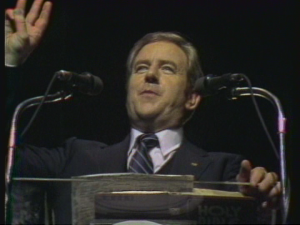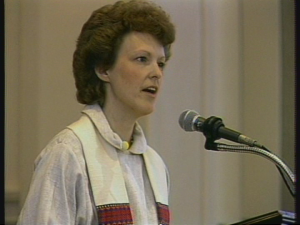
In 1987 when this documentary was filmed as part of Bill Moyers’ “God and Politics” series for PBS, the religious right had been on the move for 10 years. In this film we trace the fundamentalist take over of the Southern Baptist denomination — the largest Protestant denomination in the United States with 37,000 churches and more than 14 million members, who raise 3.5 billion dollars annually for their programs, 7,000 missionaries, 53 colleges and 6 seminaries.
Moyers interviews the movers and shakers of this Biblical literalist movement as they maneuver to take over the leadership of all the ministries of the denomination and the boards of trustees at their institutions. People like W. A. Criswell, minister and spiritual leader of the movement; Paul Pressler, a Houston judge and lay minister who articulates the political strategy of this movement; and Robert Teneray, editor of a Baptist newspaper who claims that this fundamentalist victory over the Southern Baptist denomination is more significant than the Protestant reformation. It’s the second reformation!”

Moyers also interviews some of the moderates including James Dunn, who heads the Baptist Committee on Public Affairs in Washington, D.C. lobbying to keep church and state separate; Daniel Vestal, minister of First Baptist Church in Midlands, Texas with 7,000 members and Nancy Sehested, one of the very few women ministers in the denomination who is challenging the fundamentalist prohibition against women in the ministry. All of them express profound concern for the politicization of the conflict in their denomination. Says Vestal: “It’s our side against your side. We win, you lose. Maybe that’s valid in the secular political arena. But it doesn’t belong in the Kingdom of God.”
For Moyers, this is a personal story, as he was raised in the First Baptist Church in Marshall, Texas. “It’s where I learned about faith…and democracy. Because the Baptists are passionate about the concept of the priesthood of the believer. Every human being has access to God and the Bible, no priest or minister can intervene. Everybody is equal before God. It’s where I learned to be a democrat with a little “d.” Where each church made its own decisions about mission and activities. ” But that is all changing now as a Biblical innerancy movement has swept the denomination. Lines have been drawn, loyalty oaths are demanded and agendas are rigid.
As we examine the machinations of this ten year “holy war” we see how the stakes are not only theological but, says Moyers, “they are also political. The fundamentalist party wants to make one view of the Bible — their view — the truth. For Baptists, that’s radical. For America, it’s political dynamite, because how Baptists read the Bible affects their votes at the ballot box.”
We watch as a group of literalist militants turn the Southern Baptist convention into a vast precinct for the Republican Party with Ronald Reagan as their candidate.

Says James Dunn: “Baptists always spoke about soul freedom. They believed in the reformation doctrine of priesthood of the believer. And they always agreed to disagree. They promoted freedom of consciousness, the universal right to say no to God, or to any and all assaults on the intellect, or any appeals to emotion. Now, there is nothing Baptist about purging people.”